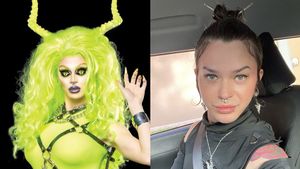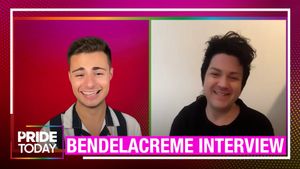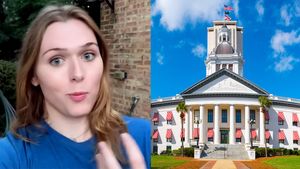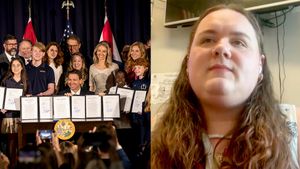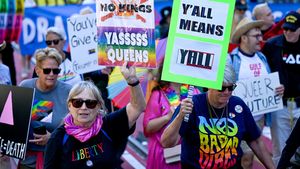The modern age has brought many technological wonders. But for mental health, technology can also be very harmful. Studies have shown that Instagram, for example, can exacerbate issues tied to anxiety, self-esteem, and body image. And while dating and hookup apps have created new ways of connecting within the LGBTQ+ community, they can also feel dehumanizing and alienating for many users.
In short, the digital social landscape can be a volatile one, particularly in a post-COVID world that cut off many vulnerable folks from their support networks. To navigate this terrain, Out consulted with the experts at Unitē, an app that “bridges the gap between self-help and therapy through the curation of content and community,” says founder Bryan Kosarek. Unitē offers resources and advice from wellness experts while also creating a forum for bringing LGBTQ+ folks together. Surprise, surprise: Our greatest resource for finding better mental health is one another.
Below, see what the experts say about seeking queer connection (and help) through tech. And learn more at TheUniteApp.com.
Lockdown left many people — particularly LGBTQ+ folks — feeling isolated. What is the first step you’d recommend to someone who wants to reconnect with others and find community?
“Building a bond with another individual can take anywhere from three to nine weeks. So the first step is to create a short list of people and activities that can even offer you consistent connection. Consider joining LGBTQ+ sports leagues, fitness centers, book clubs, nonprofit volunteering, places of worship, or classes. By doing so, you can streamline social experiences, curate communities, and build healthy and supportive relationships. Consistency is the key.” — Bryan Kosarek, founder of Unitē @theuniteapp theuniteapp.com
The second?
“A surefire way to find people who are open to talk is to chat up the people hosting the events. They put on these events to connect and help others to connect. Continuity is important too, so if you are trying out a new space, try going at the same time or day of the week. You’ll find that seeing the same people two or three times helps give you a basis to connect.” — Renae Johnson, licensed therapist @openspacetherapycollective openspacetherapycollective.com
LGBTQ+ people have always been at the forefront at using technology to find connection. But hookup apps, ironically, can often be alienating. What advice would you give a queer person looking for fun and romance without feeling like a headless torso?
“Our community utilizes apps for multiple purposes. The behavior on these apps can feel cruel, upsetting, and alienating if you're swimming against the current of headless torsos and without intention. It’s important to distinguish in what context we are using these apps. Am I looking for fun? Romance? A little bit of both? Knowing this before we load the grid saves us some uncomfortable conversations and confusion. State what you’re looking for in your bio, invest time or energy when there’s alignment, and remember you’re driving this car and get to choose who gets in and out of it.” — Andrew Joseph Borden, associate marriage and family therapist @ajbtherapy ajbtherapy.com
Are there Grindr/Scruff best practices you’d recommend?
“Your worth is not determined by how you are treated and judged online by those 2,000 feet away. However, if you are running into the same type of relationships, types of people, and/or patterns, try a different approach or communication style. Also, be open about deal breakers in the past upfront (i.e., STIs, divorce, monogamy). People really value vulnerability and confidence. And if you feel like you’ve hit a dead end, criticizing or wanting to have a conversation about the other person’s behavior may only lead to further unwanted behavior or keep you in a reenactment from past relationships. The best practice here is to move on.” — Nicholas Berry, licensed marriage and family therapist @therapyisnotkryptonite sayno2kryptonite.com
In recent years, how has new technology helped you find connection with other queer people?
“What has been impressive with the rise of new technology is how niche communities are connecting to create safe spaces for self-expression. While technology like VR, AI, blockchain, and wearable tech support communities, human connection is at the heart of this movement. I’m seeing ShopQueer.co unite and empower a new generation of LGBTQ+ readers and authors through virtual books clubs and their Rainbow Book Bus. My queer gaming friends come together on platforms like Twitch.tv and find new emotional support communities while gaming. StartOut.org, along with social platforms like TikTok, have given myself and other friends LGBTQ+ mentorship and the reach to launch our entrepreneurial journeys. Queer connection is happening all around once we get clear on our core values and what we’re passionate about.” — Bryan Kosarek
“Self-care” often feels like a marketing line these days. What does self-care mean to you, and how do you practice it?
“There are two ways that we think about self-care: Prioritize the things and people that fill you with energy, and put boundaries around the things and people that drain you. Think about the friends you share a connection with, who help you process your feelings, the books and movies that open your creative thinking, and ways you engage your body that make you feel strong. These are the things that embody self-care and need prioritization as a regularly scheduled part of your life. When new opportunities for social or family activities call, check in with yourself to see what energy you actually have to give and set a recovery plan for after. When we build these priorities and boundaries, we end up feeling more balanced.” — Renae Johnson
Your app, Unitē, stresses the power of individuals to engage in a “collective healing process.” What’s an easy way a person can do this to help others and maybe themselves along the way?
“It can sound cliche, but actively practicing kindness, empathy, and listening to others is one of the best ways to help yourself and those around you. Often, we think our challenges in life are unique to us as individuals. What’s unique is how we approach them. Many in the LGBTQ+ community are navigating similar challenges and transitions impacting our mental health and happiness. Finding community is the answer to normalizing the healing process and discovering new perspectives to help us move more quickly through difficult times.” — Bryan Kosarek
What is an indicator that a person needs professional help, and what is the first step toward finding it?
“If a person has already tried to seek the advice of those in their support system and still finds themselves struggling with a particular emotional issue, this is a sign it may be time to look for a therapist. What I always tell prospective clients is to find a therapist you have a strong rapport with. To find a clinician, you can ask for recommendations from people in your network, such as friends, family members, and even coworkers. Or you can check out one of the online therapist directories, such as psychologytoday.com. Go into your first couple therapy sessions with the intention of seeing how you feel in the room with your therapist. Remember, you do not have to settle for a therapist who is not right for you. You want to make sure you feel some sort of initial connection and safety before moving forward with a long-term working relationship.” — Michael Pezzullo, LGBTQ+ affirmative care and substance abuse psychotherapist @michaelpezzullo michaelpezzullo.com
What are some other digital resources you’d recommend?
“Some of our favorite LGBTQ+ wellness apps include Solace (solace.lgbt) transition technology for transgender souls, the Stigma app (thestigma.app) with micro videos to crowdsource hope and mental health support, Voda (voda.co), and Evolve (evolveinc.io) for LGBTQ+ self-care and mental health, How We Get Thru (howwegetthru.com) for mental health, Circles Emotional Support (circlesup.com) for on-demand emotional support, and the National Queer & Trans Therapists of Color Network (nqttcn.com) mental health directory for queer and trans POC.” — Bryan Kosarek
Anything else you’d like to mention?
“Self-care is not one size fits all. As a zero-waste fashion designer, I believe self-care is about doing what feels right for you and owning that with confidence. In fashion, if you own a look, no matter how far from your own internal perceptions of self, people will praise you. It all comes down to energy, confidence, and the release to play a part. If you fail to embody that spirit, the vulnerability will be noticed, and self-doubt can emerge. Through self-awareness, confidence is a skill that can be developed and strengthened over time. Begin by understanding your authentic needs and wants, pay attention to your internal dialogue, and then replace negative thoughts with positive self-talk and affirming statements.” — Francisco Alcazar, zero-waste fashion designer and climate change advocate @francisco.alcazar franalcazar.com
To learn more about the Unitē app and Unitē Social, the new social community that launched in Los Angeles, visit theuniteapp.com. If you’re thinking about suicide, are worried about a friend or loved one, or would like emotional support, the Lifeline network is available 24/7 across the United States. Dial or text 988.
This article is part of the Out September/October issue, available on newsstands August 29. Support queer media and subscribe — or download the issue through Amazon, Kindle, Nook, or Apple News.






























